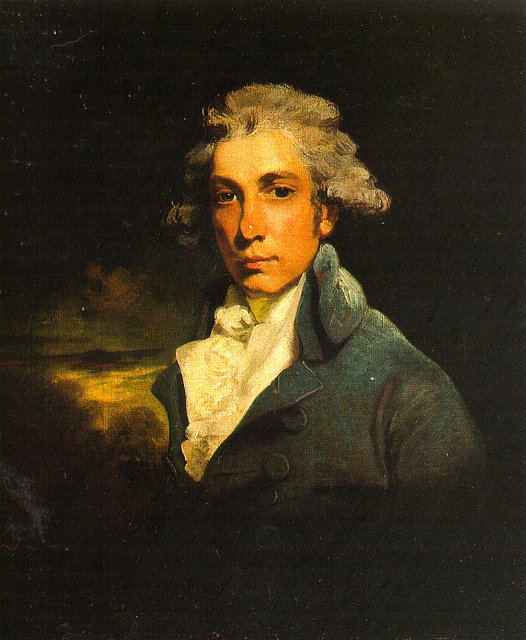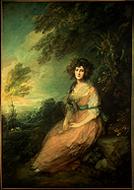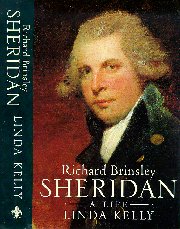The Sheridan Family
Alicia (Sheridan) Lefanu
1753
Thomas Sheridan
Frances
(Chamberlaine) Sheridan
Mr. Joseph Lefanu
Amy Sheridan
Thomas Sheridan
Elizabeth MacFadden
Anne Sheridan
Thomas Sheridan
Elizabeth MacFadden
Charles Francis Sheridan
June 1750
Thomas Sheridan
Frances
(Chamberlaine) Sheridan
In 1757, Charles entered Samuel Whyte's grammar school in Dublin. W.F.M.
Groome claims that Charles became the Secretary of State, in England, but I
have been unable to confirm this.
- Harlequin
Sheridan by Raymond Compton Rhodes
- Groome family tree written by W.F. Montague Groome in 1922, with later
annotations
Elizabeth Sheridan
Thomas Sheridan
Elizabeth MacFadden
Elizabeth is a candidate for the "Miss Sheridan" of County Cavan who married
Thomas Smyth in 1750. Rhodes writes that
"Elizabeth was a firm believer in the 'Banshi, or female daemon attached to
certain ancient Irish families.' She seriously maintained that the Banshi of
the Sheridan family was heard wailing beneath the windows of Quilca before
the news arrived from France of the death of Frances Sheridan at Blois. Her
niece made her very angry by observing that as Mrs. Sheridan was by birth a
Chamberlaine, a family of English extraction, she had no right to the
guardianship of an Irish fairy, and therefore the Banshi had made a
mistake."!
Elizabeth (Sheridan) Lefanu
1758
Thomas Sheridan
Frances
(Chamberlaine) Sheridan
Mr. Henry Lefanu
A collection of "Betsy's" letters
was later published as Betsy
Sheridan's
Journal : Letters from Sheridan's Sister, 1784-1786 and 1788-1790.
- by Raymond Compton Rhodes
- Groome family tree written by W.F. Montague Groome in 1922, with later
annotations
Emily Sheridan
Thomas Sheridan
Elizabeth MacFadden
Hester (Sheridan) Knowles
In Capel Street, Dublin (in King
James's Mint House, wher her father kept his school)
Thomas Sheridan
Elizabeth MacFadden
Mr. Knowles
James Sheridan
Thomas Sheridan
Elizabeth MacFadden
Meliora Sheridan
Thomas Sheridan
Elizabeth MacFadden
Patrick Sheridan
Farmer
- Harlequin
Sheridan by Raymond Compton Rhodes which references Alumni Dublinenses on the entry of Patrick's
son to Trinity College.
Richard Sheridan
Thomas Sheridan
Elizabeth MacFadden
- by Raymond Compton Rhodes
 Richard
Brinsley
Sheridan
Richard
Brinsley
Sheridan
30 October 1751, at12 Dorset Street,
Dublin, Ireland
4 November 1751, in St. Mary's
Church, Mary St, Dublin, Ireland
Thomas Sheridan
Frances
(Chamberlaine) Sheridan
 Elizabeth Ann Linley, daughter of Thomas Linley, in 1773.
Elizabeth was a renowned singer and beauty, a painting of whom, entitled
"Mrs. Richard Brinsley Sheridan" by Thomas Gainsborough, now hangs in the
National Gallery of Art, in Washington D.C. Elizabeth died of tuberculosis
in 1792.
Elizabeth Ann Linley, daughter of Thomas Linley, in 1773.
Elizabeth was a renowned singer and beauty, a painting of whom, entitled
"Mrs. Richard Brinsley Sheridan" by Thomas Gainsborough, now hangs in the
National Gallery of Art, in Washington D.C. Elizabeth died of tuberculosis
in 1792.
Esther Jane "Hecca" Ogle, the
daughter of the Dean of Winchester.
- Charles Brinsley Sheridan (1796 - 1843)
7 July 1816, in London, England
13 July 1816, in Poet's Corner, in Westminster Abbey,
London, England
Richard was first educated at Sam Whyte's grammar school in Dublin, and
afterwards at Harrow. He became a noted playwright at a young age - The
Rivals and The Duenna were first performed in 1775, when he was just 24, and
his masterpiece, , opened at Drury Lane on 8 May 1777 to great
acclaim. He never wrote another comedy. In 1806, William Meyler suggested
the Sheridan would never write another play, for fear of not living up to
expectations:- In his Poetical Amusements we
find:
'Of one man, Sir, you've too much fear.'
'Fear? Whom? I dread no man's control?'
'Yes, yes, you dread him to the soul'
'Name him at once, detractive Vandal!'
'The author of The School for Scandal'
In 1776, Sheridan succeded David Garrick as manager of Drury Lane, then one
of only two licensed winter playhouses in London. After producing The
School
for Scandal there in 1777, his interest dwindled, and his
mis-management of the theatre, especially after he entered politics, became
legendary. In 1778, his father, Thomas Sheridan, a theatre manager in
Dublin, was brought in to manage Drury Lane (but his son still banned him
from performing - Richard still rankled at childhood insults of being a
"player's son"). Sheridan entered Parliament in September 1780, being
elected in the independent seat at Stafford. In later life, he recalled that
that evening "he stole away by himself to speculate upon these prospects of
distinguishing himself which had been opened to him," and that this was "the
happiest moment of his life". Richard rose to become one of the most notable
parliamentary figures of the age, but he failed to hold high political
office, serving most of his time in oppostion. He served briefly as
Secretary of the Treasury in the North-Fox coalition in 1783 (to the delight
of satirists who recalled his financial mismanagement of Drury Lane), and as
Treasurer of the Navy in 1806. His fame, however, came as a great speaker,
most notable during the Hastings impeachment hearing in 1787, and for this
close relationship with the Prince of Wales, especially important during the
Prince's Regency. A barb from his parliamentary life that I like is "The
Right Honorable gentleman is indebted to his memory for his jests, and to
his imagination for his facts".
Richard had a choatic private life, marked by infidelity, drinking and money
problems. His first marriage, to the beautiful singer Elizabeth Linley,
began romantically with an elopement and two duels for her sake. But his
infidelities were notorious, driving her into the arms of Lord Edward
Fitzgerald, by whom she eventually had a child, although they reconciled
before her death. His second wife was treated just as badly. No wonder one his most famous quotations
from his plays is "'Tis safest in matrimony to begin with a little
aversion."! Sheridan's finances were grossly mismanaged. Despite being
reasonable wealthy from the success of his plays, he spent lavishly, often
maintaining three separate houses, and was constantly in debt. For all his
faults, his charm was irresistible -"there has been nothing like it since
the days of Orpheus", wrote Byron.
Richard Brinsley Sheridan's life appears as one of genius potential
unfulfilled. He toyed with what he excelled at - his playwright abilities,
treating it partly with amusement, and partly with contempt. He spent a lot
of his energy and money managing Drury Lane when he was abysmal as a
manager. His great oratorical skills and his personal relationship with the
Prince of Wales should have set up for brilliance in Parliament, but this,
too, was never truly fulfilled - lost in his procrastination, pride and
mismanagement, as well as his devotion to the Catholic cause which put him
in almost perpetual opposition to the government. His personal life, too,
had the makings of a wonder - his marriage to, and admiration from, the
talented and beautiful Elizabeth Linley was something he never appreciated
until she died. She was his muse - and he womanised, gambled and drank away
the woman who made him whole; after her death he was never the same, despite
his re-marriage. He spent his self-made fortune profligately, and died with
his house in the possession of bailiffs. He was a genius without the
discipline to fully utilise that potential.
A number of biographies have been written about this colourful individual.
The one I have drawn most on is , by Raymond Compton Rhodes. Another, more readily
available biography is ,written by Linda Kelly, as well as , by James Morwodd and
,
1751-1816 by Fintan Otoole.
Plays:
Poems:
Here's
to
the Maiden of Bashful Fifteen
If a
Daughter you have
Had
I
a Heart for Falsehood Framed
Richard Sheridan
Richard Sheridan
Richard was a barrister, designated
K.C. (King's Counsel)
Thomas Sheridan
Rev. Dr.
1687
Patrick Sheridan
Elizabeth MacFadden
10 October 1738, at Rathfarnham, near
Dublin
Thomas was admitted to Trinity College, Dublin, in 1707. Celebrated as a
friend of Jonathan Swift, who was the godfather to Thomas's children, and
wrote Gulliver's Travels while staying at
the Sheridan house in Quilca in 1724. Later, Swift wrote a humourous poem
about Quilca, mocking Thomas Sheridan's pride in the place:
TO QUILCA, A COUNTRY-HOUSE IN NO VERY GOOD REPAIR
Let me thy Properties explain,
A rotten Cabin, dropping Rain;
Chimnies with Scorn rejecting Smoak;
Stools, Tables, Chairs, and Bed-steds broke:
Here Elements have lost their Vses,
Air ripens not, nor Earth produces:
In vain we make poor Sheelah toil,
Fire will not roast, nor Water boil.
Thro' all the Vallies, Hills, and Plains,
The Goddess Want in Triumph
reigns;
And her chief Officers of State,
Sloth, Dirt, and Theft
around her wait.
Thomas Sheridan
1719, in Dublin, Ireland
Thomas Sheridan
Elizabeth MacFadden
Frances
Chamberlaine in Dublin, Ireland
Thomas was educated at Westminster school and Trinty College, Dublin, and
became an actor, a teacher of elocution, and a theatre manager in Dublin. In
1758, beset by financial difficulties, Thomas moved to London where he
received a State-pension of £200 a tear to complete a Pronouncing
Dictionary of the English Language. In 1764, he took Charles and
his daughters to Blois, in France, to be safe from his creditors. After
Frances' death in 1766, he returned to England, and the whole family moved
to Bath in 1771.
14 August 1788, in Margate, Kent,
England
St. Mary's Church, Mary St, Dublin,
Ireland
- Harlequin
Sheridan by Raymond Compton Rhodes
-
- Groome family tree written by W.F. Montague Groome in 1922, with later
annotations
- IGI: AFN JW1X-Q5
Thomas Sheridan
1746/7
Thomas Sheridan
Frances
(Chamberlaine) Sheridan
1750
- Thomas was aged 3 at
his death in 1750.
- Harlequin
Sheridan by Raymond Compton Rhodes
- Groome family tree written by W.F. Montague Groome in 1922, with later
annotations
Return to Chris Gosnell's Home Page
If you have any comments, additions or modifications to the information on this page, please feel free to email me.
Created and maintained by: chris@ocotilloroad.com
 Richard
Brinsley
Sheridan
Richard
Brinsley
Sheridan Richard
Brinsley
Sheridan
Richard
Brinsley
Sheridan Married
(1st): Elizabeth Ann Linley, daughter of Thomas Linley, in 1773.
Elizabeth was a renowned singer and beauty, a painting of whom, entitled
"Mrs. Richard Brinsley Sheridan" by Thomas Gainsborough, now hangs in the
National Gallery of Art, in Washington D.C. Elizabeth died of tuberculosis
in 1792.
Married
(1st): Elizabeth Ann Linley, daughter of Thomas Linley, in 1773.
Elizabeth was a renowned singer and beauty, a painting of whom, entitled
"Mrs. Richard Brinsley Sheridan" by Thomas Gainsborough, now hangs in the
National Gallery of Art, in Washington D.C. Elizabeth died of tuberculosis
in 1792.  ,written by Linda Kelly, as well as The
Life
and Works of Richard Brinsley Sheridan, by James Morwodd and
A
Traitor's Kiss : The Life of Richard Brinsley Sheridan,
1751-1816 by Fintan Otoole.
,written by Linda Kelly, as well as The
Life
and Works of Richard Brinsley Sheridan, by James Morwodd and
A
Traitor's Kiss : The Life of Richard Brinsley Sheridan,
1751-1816 by Fintan Otoole.